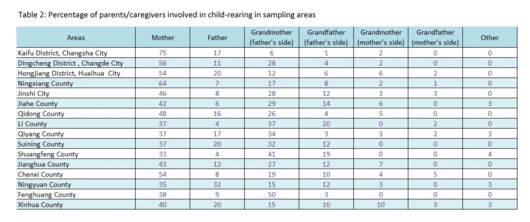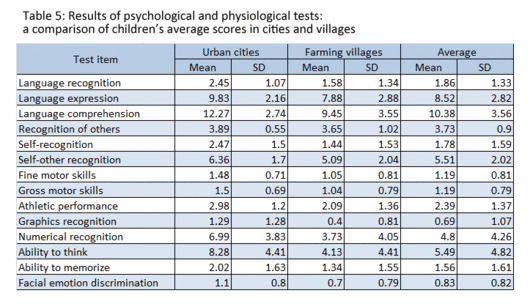Questions
In general, equal preschool education refers to the equality of educational opportunities where preschool children from socially disadvantaged families can receive the same quality of education as those children from affluent families. According to the recent data, however, the majority of young children in farming villages, which account for about 80% of the total child population of China, do not receive the average level of education. In fact, kindergarten enrollment rates in villages are only around 20%. Even for children who are lucky enough to enter kindergarten, it is doubtful that they are receiving 'preschool education' in the real sense of the word, since many kindergartens simply adopt the primary school curricula that have been designed for older children. In addition, the parents of these children have not had the advantage of good quality education. Nowadays, many young parents in villages have become migrant laborers in order to support the family, so that childcare falls to the grandparents who are older and even less educated.
This situation gives rise to such questions as: How will such childrearing by grandparents affect children? How can we provide appropriate education to children in villages, in order to realize equal education? With these questions in mind, we conducted a comparative survey of children aged 37 to 48 months living in cities and villages (17 prefectures and cities) of the Hunan Province from March through May 2010.
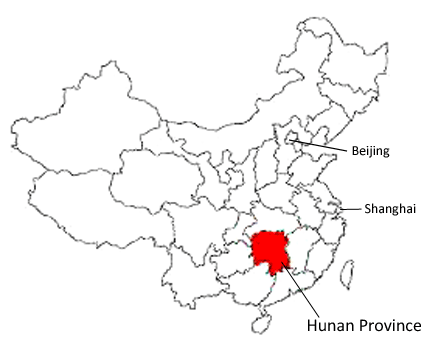
Survey method
1. Target group
The target group of this survey was children aged 37 to 48 months and their parents, consisting of 313 pairs and 699 pairs recruited from urban cities and farming villages, respectively, across the Hunan Province.
The educational background of the parents in this sample from cities and villages is shown in Figures 1 and 2. The results indicate that the majority of the parents in farming villages have completed primary or junior-high school, whereas the majority of those living in urban cities have completed junior-high, high, or vocational school or higher.
The financial status of the parents was also considered in the sampling procedures. Table 1 shows the income distribution of sample families by region: we chose twelve farming villages where the average annual family income (GDP per capita) is 10,000 to 20,000 yuan, and four urban cities where the respective income is 20,000 yuan or more.
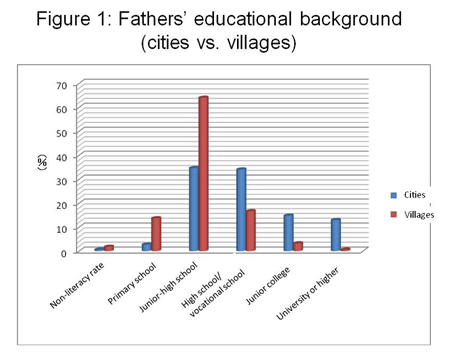
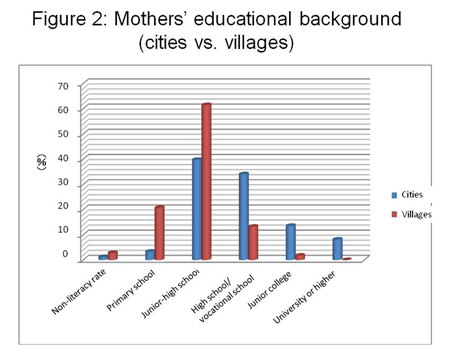
The following three questionnaire formats were used.
- o A questionnaire for parents and carers involved in child-rearing (developed under collaboration with the World Bank)
- o Development of social and emotional skills of children aged 37 to 48 months (independently developed)
- o Children's cognitive, language and physical development (independently developed)
3. Survey method
The survey was carried out through a closed-end questionnaire (one answer per question) for the parents/caregivers, and a face-to-face interview with children.
Survey results
1. Actual conditions of child-rearing by region
Table 2 shows the actual conditions of parents and carers involved in child-rearing by region (for the geographical distribution of average family income, see Table 1).
From 54-75% of the mothers living in urban cities are responsible for child-rearing themselves, whereas the percentage is lower for mothers (33-48%) in farming villages. In areas of poverty the average is lower, with only 37% of fathers/mothers responsible for child-rearing themselves.
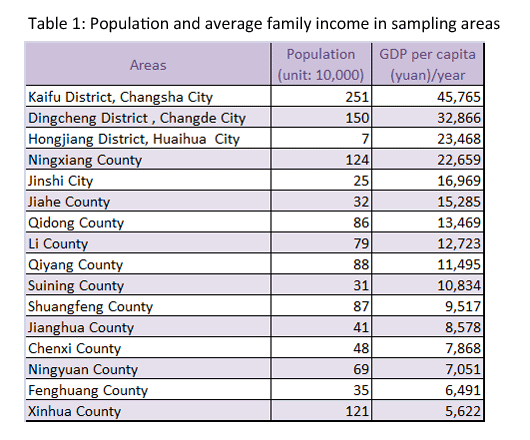
2. Reading to and playing with a child
Table 3 shows the survey results relating to child-rearing practices of parents and carers in urban cities and farming villages, i.e., reading to and playing with their child. The statistical data indicate that parents/caregivers in villages spend less time every week reading to and playing with their child than those in cities at the p<.001 level.
3. Kindergarten enrollment rate
Table 4 shows the kindergarten enrollment rates of the children surveyed. While the enrollment rates for children living in urban cities surpass 87-92%, the rates for those living in farming villages are on average 23%. In one extreme case, the enrollment rate in Fenghuang County is 0%.
4. Evaluation of child development
Table 5 shows the results of psychological and physiological tests for the three main areas of child development, i.e., language, cognitive and physical development. Higher scores can be interpreted as higher levels of skills achieved. Table 5 clearly indicates that children in farming villages had much lower scores in all test categories compared to those in cities.
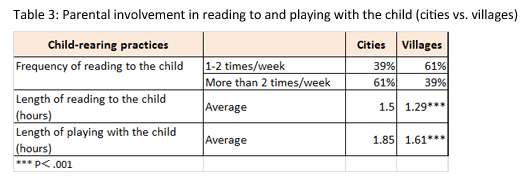
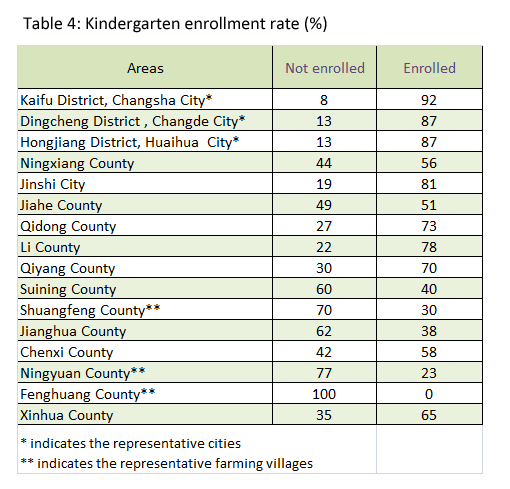
Discussion and suggestions
The results highlight preschool education gaps between cities and villages. More precisely, children in farming villages suffer from the disadvantages of growing up in an environment where most of their parents with a poor academic background and low income do not have time for child-rearing, including reading to and playing with their child, nor can they afford to pay for kindergarten. Compared to children living in cities, such children scored lower on tests of every aspect of child development.
These conditions are important issues that we, who engage in preschool education, should address seriously. We should find the best ways to provide equal opportunities for preschool education to children in farming villages, so as to help them build the foundation that all children need in order to further develop their knowledge and skills throughout life.
We cannot improve the educational background and financial conditions of children's parents in the immediate future; however, in the meantime, we can suggest some practical, best possible solutions for preschool education in villages, such as actively increasing parents' awareness of child-rearing, improving their parenting practices, and establishing more village kindergartens.
(1) Increase parents' awareness of more positive child-rearing
Encourage parents to read to their child: provide more than ten books to each family in farming villages through the "Presenting Books with a Smile" activity; at the same time, encourage parents to read the books to their child as a daily habit, at least 30 minutes per day.
(2) Encourage parents to play with their child
Through donations and volunteer activities, provide village children with more than ten toys that will help their mental and physical development. Volunteers can also teach the children and their parents how to make a simple toy using waste and natural materials. In addition, explain to the parents the need to correct the traditional misconception that "Playing spoils a child, only diligence can achieve accomplishments," make them fully understand the importance of playing with their child and ensure they spend at least one hour playing everyday with their children.
(3) Establish more village kindergartens using local resources
Discuss the low rates of kindergarten enrollment in villages with local educational authorities, and establish kindergartens providing basic facilities according to the living conditions of each village. More precisely, by utilizing cultural and physical resources in the community, establish kindergartens that can provide children with (at least) minimum facilities and equipment to play and learn which will effectively help children develop in the five main areas*1, i.e., health, social skills, science, language and arts.
For these 'basic' village kindergartens, there are two groups from which to secure the necessary teachers: talented and ambitious young people who have just completed teacher training programs; and students who are currently studying preschool education at high school or teacher's school. In the former case, train them as qualified teachers for village kindergartens, and for the latter case, employ them as volunteer trainee teachers sending them to village kindergartens within the prefecture to which they belong, for three or six months, or one year at the longest. In this way, students can gain work experience as a teacher in the villages that earnestly need kindergarten teachers.
Lastly, in order to provide truly equal educational opportunities for all children in a broad number of farming villages in China, we should start our reform at the micro level of society, i.e., family and kindergarten: educate parents in villages and increase their awareness of positive child-rearing practices and establish more basic kindergartens to support their child's development. In this way, all children and parents in villages will be able to enjoy the benefits of preschool education and share their child's accomplishments and hopes for the future.
- *1: Five main areas in kindergarten education defined by the Guidance on Kindergarten Education of the Ministry of Education of the People's Republic of China, which include health, social skills, science, language and arts.
- *: This survey was sponsored by the Research Department for Education in the Asian Region of the World Bank and the National Population and Family Planning Commission of China. I would like to extend my deepest appreciation to these institutions for their tremendous ongoing support to us.



